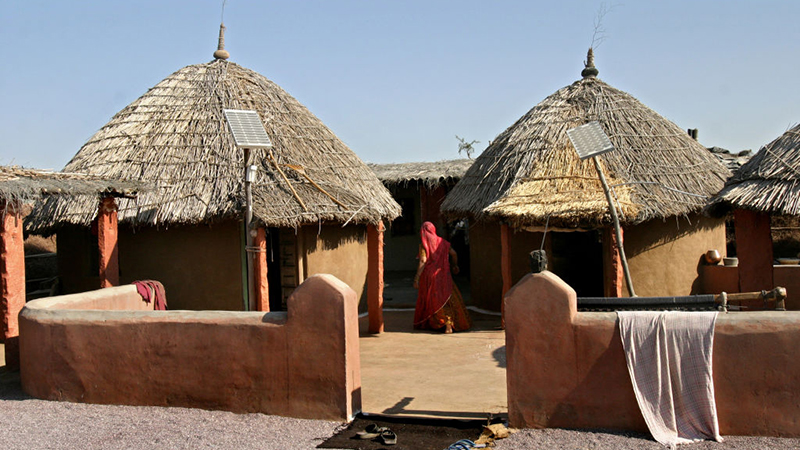Trending
New United Nations Report Signals Need for Mud and Grass Huts by 2050

It’s all a big ‘conspiracy theory’ that by 2050 we shall be living in mud and grass huts, eating a meat-free diet and giving up most forms of personal transport. Maybe we might not believe it if global elites stopped writing copious reports detailing all these lifestyle changes, which are said to be needed to move to Net Zero. The latest such report comes from the United Nations, which sets out a collectivist global vision of primary building materials consisting of mud bricks, bamboo and forest “detritus”.
According to the UN, the world needs to move to “regenerative material practices” using “ethically produced” low carbon earth and bio-based building materials. Examples include mud bricks, timber, bamboo and agricultural and forest detritus. The report harks back to the middle of the last century when the vast majority of cultures built large buildings and cities out of indigenous earthen, stone and bio-based materials, including timber, cane, thatch and bamboo. Contrasting modern concrete, steel and glass buildings, it observes that “massive mud buildings have been maintained for centuries with their structures intact”.
The UN’s recently published report, ‘Building Materials and the Climate: Constructing a New Future‘, draws on a wide variety of international authors. Heavily involved are Yale University and the Global Alliance for Buildings and Construction, the latter operation drawing financial support from the green activist Laudes Foundation and the British Government. The report is one of a number that have appeared recently that have started to lay out the hard changes that will need to be made in less than 30 years if 80% of the world energy produced by fossil fuel is banned under Net Zero. The construction sector is said to account for 37% of human-caused emissions of gases such as carbon dioxide. Making progress on reducing this will require drastic measures with the report stating that materials such as concrete, steel and aluminium will be used only when “absolutely necessary”.
War on modern building materials has also been declared by U.K. FIRES, an academic collaboration funded with a £5 million state grant. It has called for a ruthless purge of traditional building supplies, to be replaced with materials such as “rammed earth”. In other reports, U.K. FIRES promotes a world with no flying and shipping by 2050, drastic cuts in home heating and bans on beef and lamb consumption. As we have noted in the Daily Sceptic, U.K. FIRES bases its recommendations on the brutal, and many would argue honest reality of Net Zero. It does not assume that technological processes still to be perfected, or even invented, will somehow lead to minimal disturbance in comfortable industrialised lifestyles.
The latest UN report, along with U.K. FIRES, gives a valuable insight into the fantasy thinking surrounding the belief that oil and gas can be removed from industrial society. Clever people can often be very stupid, especially when group-think takes hold and ‘high status’ opinions – in this case surrounding environmentalism – are required to join the club. Net Zero mandates the dismantling of modern industrial society and the discarding of many of the essentials of modern comfortable living. Using flawed, unproven science, these high-status elites have convinced themselves that the climate is collapsing. Those who know their religious history observe doomsday cults emerging in every era, demanding sins should be purged, and humans pleasures placed on strict, supervised ration.
It will hardly be a surprise that the UN buildings report is riven with demands for legislative action and the use of other people’s money to enforce its crackpot schemes. Government “incentives, awareness campaigns and legal and regulatory frameworks” are said to have been effective in previous recycling schemes. “Recycling systems for building materials tend to require similar kinds of support across countries,” the report states. It need hardly be noted that “far more investment” is required for measures that ensure cooperation across sectors and borders. Due to the complexity of what is being proposed, “regulation and synergistic enforcement is required across all phases of the building life cycle, from extraction through to end-of-use”.
Needless to say, when re-ordering the lifestyles of eight billion people around the world, it is important to tackle gender bias wherever it is found – in this case, “formal and informal building sectors”. Gender bias is said to be prevalent across the building trade and in emerging economies. Government programmes (quelle surprise) and policies are needed to expand women’s access to new technologies, marketing information and training to sustain their participation on the ground, the report states.
The biggest muddle however arises from the use of sustainable materials, most of which are grown in the ground. That would be the planned agriculture sector that another elite body is busy arguing should be cut back for re-wilding, another group of elite idiots arguing for nitrogen fertiliser to be banned leading to a 50% reduction in crop growth, another bunch of bright sparks demanding more land for bio-fuels and plant-based diets… to be continued.
Read the full article here


















